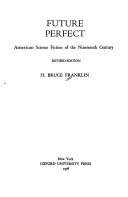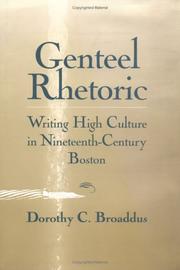| Listing 1 - 2 of 2 |
Sort by
|

ISBN: 0195023234 0195023226 9780195023220 9780195023237 Year: 1978 Publisher: London Oxford New York Oxford University Press
Abstract | Keywords | Export | Availability | Bookmark
 Loading...
Loading...Choose an application
- Reference Manager
- EndNote
- RefWorks (Direct export to RefWorks)
Science fiction, American. --- Science-fiction américaine --- Science fiction, American --- Science-fiction américaine --- Hawthorne, Nathaniel --- Criticism and interpretation --- Poe, Edgar Allan --- Melville, Herman --- Bellamy, Edward --- Irving, Washington --- Twain, Mark --- Science fiction --- 19th century --- London, Jack --- Higginson, Thomas Wentworth --- Bierce, Ambrose Gwinett --- O'Brien, Fitz-James, 1828?-1862

ISBN: 0585350418 9780585350417 1570032440 Year: 1999 Publisher: Columbia, S.C. : University of South Carolina Press,
Abstract | Keywords | Export | Availability | Bookmark
 Loading...
Loading...Choose an application
- Reference Manager
- EndNote
- RefWorks (Direct export to RefWorks)
Situated in mid-nineteenth-century Boston culture, Genteel Rhetoric combines history and cultural studies to examine the shaping of nineteenth-century North American rhetoric and aesthetics. The practitioners of genteel rhetoric included many of the writers who belonged to the New England school: Ralph Waldo Emerson, James Russell Lowell, Oliver Wendell Holmes, Charles Eliot Norton, and Thomas Wentworth Higginson. Harvard graduates and students of Edward T. Channing, Boylston Professor of Rhetoric and Oratory from 1819 to 1851, these men were also influenced by the Unitarian rhetoric of Channing's brother, William Ellery Channing, as well as by orators such as Edward Everett. They were part of a larger North American refinement movement - a movement interrupted by the Civil War. Broaddus argues that the genteel and coherent voices with which these writers discuss literature and high culture break apart when they begin to write about material issues related to slavery, abolition, and war against the background of growing dissent between North and South. Genteel Rhetoric examines the writers as they live through and write about the Civil War - Emerson and Lowell from a safe distance, Holmes searching for his wounded son in Maryland, and Higginson in the thick of action as colonel of the First South Carolina Volunteers, the first regiment of former slaves in the Union army.
American literature --- Rhetoric --- English language --- Language and culture --- Unitarians --- Authors, American --- American Literature --- English --- Languages & Literatures --- American authors --- Unitarian Universalists --- Culture and language --- Culture --- Germanic languages --- Language and languages --- Speaking --- Authorship --- Expression --- Literary style --- English literature --- Agrarians (Group of writers) --- History and criticism. --- Social aspects --- History --- Study and teaching --- Intellectual life. --- Homes and haunts --- Rhetoric. --- History and criticism --- Intellectual life --- Higginson, Thomas Wentworth, --- Holmes, Oliver Wendell, --- Lowell, James Russell, --- Emerson, Ralph Waldo, --- Imarsana, Rāfa Vālḍō, --- Emerson, R. W. --- Emerson, Waldo, --- Emerson, R. Waldo --- Ėmerson, Ralʹf Uoldo, --- Ai-mo-sheng, --- Emarsan̲, --- אמרסון, רלף ולדו, --- עמערסון, ראלף וואלדא, --- J. R. L. --- L., J. R. --- Melibœus-Hipponax, --- Wilbur, Homer, --- Holmes, O. W. --- Higginson, T. W. --- Technique. --- Boston (Mass.) --- City of Boston (Mass.) --- Beantown (Mass.) --- بوسطن (Mass.) --- Būsṭun (Mass.) --- Бостон (Mass.) --- Горад Бостан (Mass.) --- Horad Bostan (Mass.) --- Бостан (Mass.) --- Bostan (Mass.) --- Бостън (Mass.) --- Bostŭn (Mass.) --- Βοστώνη (Mass.) --- Vostōnē (Mass.) --- Bostono (Mass.) --- بوستون (Mass.) --- Pô-sṳ-tun (Mass.) --- 보스턴 (Mass.) --- Bosŭt'ŏn (Mass.) --- Posŭt'ŏn (Mass.) --- Pokekona (Mass.) --- בוסטון (Mass.) --- Bostonia (Mass.) --- Bostona (Mass.) --- Bostonas (Mass.) --- ボストン (Mass.) --- באסטאן (Mass.) --- Bostons (Mass.) --- 波士顿 (Mass.) --- Boshidun (Mass.) --- Massachusetts --- 19th century --- Higginson, Thomas Wentworth --- Technique --- Holmes, Oliver Wendell --- Lowell, James Russell --- Emerson, Ralph Waldo
| Listing 1 - 2 of 2 |
Sort by
|

 Search
Search Feedback
Feedback About UniCat
About UniCat  Help
Help News
News